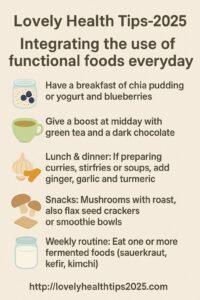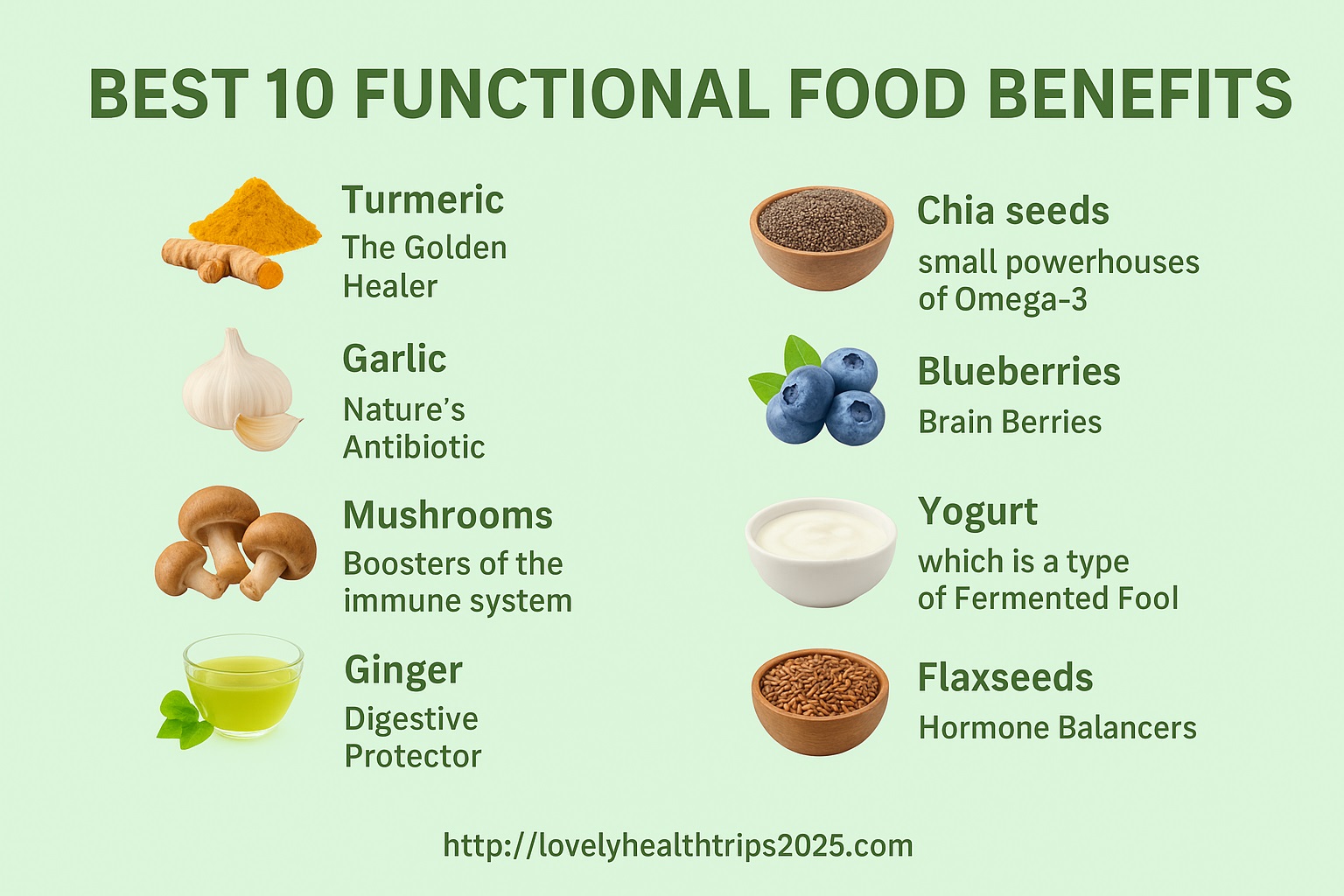Last Updated on October 21, 2025 by
Medicinal foods which heal, protect & provide energy to our body – Functional Food Benefits
Introduction
Researchers and nutritionists today focus on functional foods that we consume on daily basis which provides calories and nutrients and also support therapeutic, preventive and medicinal value.
These foods have been investigated to prevent chronic diseases, improve mental clarity and improve gut health (from turmeric that lowers inflammation to mushrooms that boost immunity). Functional foods can be consumed daily unlike supplements, thus making them an affordable and convenient means of maintaining good health.
This blog deals with the realm of functional foods, their types, the proven benefits of these foods and how to make the best use of this information in family meals.
What Are Functional Foods?
Functional foods are natural or fortified foods and it is not a basic food. They possess bioactive compounds which include antioxidants, probiotics, polyphenols, omega-3s and flavonoids that prevent or manage certain health conditions.
Types of Functional Foods:
- Natural Functional Foods : Foods that exhibits the healing qualities by their own e.g., turmeric, ginger, garlic etc.
- Probiotics : Foods with added vitamins and minerals (ex: vitamin D milk, probiotic yogurt).
- Superfoods: Foods that are high in nutrients with antioxidants and phytochemicals (ex: blueberries, chia seeds, spirulina etc.).

The logic behind functional food:
Studies have supported the use of functional foods in the following ways:
- Reduction of inflammation (ex: turmeric, green tea).
- Increasing immunity (e.g. mushrooms, probiotics).
- Better gut health (e.g. fermented foods, vegetables high in fibre).
- Helping the brain functions (e.g., fish, which is rich in omega-3, walnuts).
- Maintaining hormonal balance (e.g. flaxseeds, soy).
They react at the level of the cell itself, preventing oxidative stress, stimulating the intestinal flora and altering the expression of genes associated with preventing diseases.
10 different Functional & Nutritional foods: Functional Food Benefits
Lets discuss some of the suggested functional foods which can be easily incorporated into the family meals.
1. Turmeric — The Golden Healer
a. Key compound: Curcumin
b. Benefits:
- Creatures chronic inflammation.
- Promotes the health of joints and bones.
- Enhances the mood and functionality of the brain.
c. How to prepare: Turmeric can be added to curries, soups, golden milk or smoothies.

2. Garlic — Nature’s Antibiotic
a. Key compound: Allicin
b. Benefits:
- Antiviral and natural antibacterial properties.
- Reduces the blood pressure and cholesterol.
- Helps the heart health
c. Applications: With sauces, stir-fries and salads, use raw or for light cooking.

3. Mushrooms-Boosters of the immune system.
a. It includes Reishi, Shiitake, Maitake, Lion’s Mane.
b. Benefits:
- Strengthen immune response
- There are fighting infections beta-glucans.
- Achieve better recollection and cognitive ability.
c. Preparation: Mushrooms could serve in soups and stir-fries or as the basis for herbal tea.

4. Liquid Antioxidant Green Tea.
a. Key compound: Catechins
b. Benefits:
- Full of antioxidants to protect the cells.
- Promotes metabolism and weight level.
- Enhances brain and heart wellbeing.
c. Routes of administration: Consume 125 ml to 250 ml per day, hot or cold but not too much sugar.

5. Ginger — Digestive Protector
a. Key compound: Gingerol
b. Benefits:
- Reduces nausea and stomach problems.
- Reduces muscle soreness
- Is anti-inflammatory.
c. How to use: Fresh ginger can be used in tea, soups or smoothies.

6. Chia Seeds Chia seeds are small powerhouses of Omega-3.
a. Nutrients: Omega-3s, fiber and protein.
b. Benefits:
- Enhance intestinal wellbeing and digestion.
- Aid cardiovascular and cerebral wellness.
- Stabilize blood sugar
c. Use: Add to Smoothies, yogurt, overnight Oats or puddings.
Link to visit Chia Seeds from Amazon : https://amzn.to/45TjHBN

7. Blueberries — Brain Berries
a. Nutrients: antioxidants, Anthocyanins.
b. Benefits:
- Keep brain cells young.
- Improve memory and focus
- Get healthy skin and heart
c. Uses: Perhaps the best use is to eat fresh, as a salad or smoothie.

8. Yogurt which is a type of Fermented Food & helps for Gut Allies.
a. These are probiotics: Lactobacillus, Bifidobacterium.
b. Benefits:
- Bring back healthy gut bacteria.
- Strengthen immunity
- Viewed as a way to improve digestion and decrease bloating.
c. How to use: Consume low fat (plain) yogurt, kefir, sauerkraut or kimchi regularly.

9. Flaxseeds- Hormone Balancers
a. Nutrients: Lignans, omega-3s, fiber.
b. Benefits:
- Promote the hormone health of women.
- Reduce cholesterol level in human
- Keep the skin and hair healthy.
c. Usage: Flaxseeds can be used in ground form, added to smoothies or porridge or baked goods.

10. Dark Chocolate for Heart & good mood promulgator.
a. Key compound: Flavanols
b. Benefits:
- Enhances cardiovascular and heart condition.
- Boosts serotonin and mood
- Gives antioxidants to the cells.
c. How to use it: Dark chocolate (70% + cocoa) can be taken as a healthy snack

Foods that different ages can use:
A. Kids & Teens
- Yogurt and fermented foods : good gut and immunity
- Blueberries : Cognitive development.
- Chia seeds : Energy for growth
B. Mothers & Women
- Flaxseeds : Hormonal balance
- Turmeric & Ginger : Not only anti-inflammatory.
- Green tea : Zero Anti-oxidant protection
C. Men & Adults
- Garlic and mushrooms : Heart and immunity.
- Dark chocolate : Heart health
- Green tea : Metabolism and mental clarity
D. Seniors
- Turmeric + mushrooms : Joint and cognitive support
- Yogurt : Bone strength
- Blueberries : Memory preservation

Integrating the use of functional foods everyday:
- Have a breakfast of chia pudding or yogurt and blueberries.
- Give a boost at midday with green tea and a dark chocolate.
- Lunch & dinner: If preparing curries, stirfries or soups, add ginger, garlic and turmeric.
- Snacks: Mushrooms with roast, also flax seed crackers or smoothie bowls.
- Weekly routine: Eat one or more fermented foods (sauerkraut, kefir, kimchi).

Care and caution
- The most important is moderation : excessive consumption of some foods (e.g., garlic) can lead to digestive problems.
- Individual Differentiation: Every functional food may not be suited for everybody e.g. soy for thyroid patients
- Functional foods should not be used as an alternative to regular medicine or during pregnancy
Concluding Points:
Natural functional foods found in our daily kitchen is very useful for our health. By adding turmeric, garlic, mushrooms, green tea, berries and others to daily meals, families can become resilient against chronic ailments, enhance their mood and energy levels while using natural sources.
Reference from Harvard Health : Foods linked to better brainpower – Harvard Health
Thanks and Regards
About the Author – “Mr. Bibhu Ranjan Mund”, Master in Public Health (MPH) from IIHMR University, Jaipur (Rajasthan) has experience of 18 years in Public Health activities. Through “Lovely Health Tips-2025”, we share the evidence & experienced based health & wellness guides with solutions for every day well-being. More from Author
Disclaimer
This information is suggestive only and not a replacement for medical advice. For more detail, please visit to my website as mentioned below:

